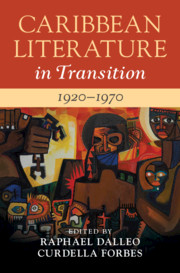Book contents
- Caribbean Literature in Transition, 1920–1970
- Caribbean Literature in Transition
- Caribbean Literature in Transition, 1920–1970
- Copyright page
- Contents
- Figure
- Contributors
- Introduction
- Part I Literary and Generic Transitions
- Part II Cultural and Political Transitions
- Part III The Caribbean Region in Transition
- Chapter 12 A Moving Centre
- Chapter 13 Canadian Routes
- Chapter 14 New Empires
- Chapter 15 Africa and the Caribbean
- Chapter 16 Cross-Caribbean Dialogues I
- Chapter 17 Cross-Caribbean Dialogues II
- Part IV Critical Transitions
- Bibliography
- Index
Chapter 13 - Canadian Routes
from Part III - The Caribbean Region in Transition
Published online by Cambridge University Press: 16 December 2020
- Caribbean Literature in Transition, 1920–1970
- Caribbean Literature in Transition
- Caribbean Literature in Transition, 1920–1970
- Copyright page
- Contents
- Figure
- Contributors
- Introduction
- Part I Literary and Generic Transitions
- Part II Cultural and Political Transitions
- Part III The Caribbean Region in Transition
- Chapter 12 A Moving Centre
- Chapter 13 Canadian Routes
- Chapter 14 New Empires
- Chapter 15 Africa and the Caribbean
- Chapter 16 Cross-Caribbean Dialogues I
- Chapter 17 Cross-Caribbean Dialogues II
- Part IV Critical Transitions
- Bibliography
- Index
Summary
Migration to England has been a better-known context for the development of Caribbean writing, but migration to Canada also shaped the region’s literary history during this period. The Windrush generation that went to England in the 1950s interacted in important ways with Canada; on the one hand, there was a parallel migration of Caribbean people and writers to Canada during this period, while on the other hand, many of the writers who first went to England visited Canada and some later relocated to Canada. This migratory experience complicated the idea of Caribbean writing as responding primarily to a British metropole and offered different ways of thinking about blackness, exile, diaspora, and belonging. Although it is Toronto that has become the major hub for Caribbean artistic activity in Canada, Montréal was an important meeting point during this period and in 1968 was the venue for the Congress of Black Writers which brought together luminaries, writers, and activists from the region, the USA, and Africa in the context of the Black Power movement. The Caribbean demographic in Canada was affected in the 1950s and 1960s by the Canadian government’s recruitment of officially ‘single’ women as domestic workers and later by significant numbers of Caribbean nationals of Indian as well as African descent. An important issue is how the migratory demographic affected the writing during the period.
- Type
- Chapter
- Information
- Caribbean Literature in Transition, 1920–1970 , pp. 209 - 224Publisher: Cambridge University PressPrint publication year: 2021



